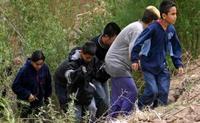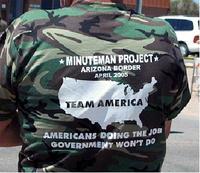-
Sharp increase in the number of unaccompanied children crossing into U.S.

DHS’ Office of Immigration Statisticsreports that U.S. Border Patrolagents apprehended 30,000 children traveling alone illegally across the Mexican border in 2013. The Border Patrol expects to arrest as many as 90,000 children this year, and about 142,000 children in 2015. The Office of Management and Budgethas notified the Senate Appropriations Committeethat the increase in the number of children crossing the border alone would cost the government at least $2.28 billion, about $1.4 billion more than the Obama administration had budgeted for in its Unaccompanied Alien Childrenprogram.
-
-
DHS relaxes employment rules for H-1B visa spouses
Last month DHS proposed two new rule changes which would allow H-4 dependent spouses of highly skilled immigrant workers who hold an H-1B, E, or L visas, to work legally in the United States. Current regulations prohibit work authorization for spouses of said visa holders. Some immigration advocates say the proposal is too narrow since getting employers to sponsor an H-1B visa applicant is already challenging.
-
-
DHS revises rules for use of deadly force on border

On 30 May DHS released new guidelines detailing when the use of force by Border Patrol officials is authorized. The lack of explicit scenarios within the rules, however, has led to questions of when such acts are truly warranted.
-
-
U.S. govt. the largest employer of undocumented immigrants
At least 60,000 undocumented immigrants have worked at federal detention centers while waiting for an immigration court to hear their case. While detained, many immigrants work as cooks and janitors at federal and privately-run detention centers, often making less than $1 a day. The cheap labor saves the federal government and private companies at least $40 million a year by making it unnecessary to pay outside contractors the $7.25 federal minimum wage. Since about half of all immigrants in immigration court typically win their case, this means that that tens of thousands of legal immigrants are working for less than a dollar a day in immigration detention facilities.
-
-
U.S. recalibrating Secure Communities
The number of municipalities cooperating with Secure Communities has grown from fourteen in 2008 to more than 3,000 today, and about 283,000 immigrants have been deported under the program between 2008 and April of this year. More and more municipalities, however, refuse to hold undocumented immigrants in jail on behalf of Secure Communities.DHS chief Jeh Johnsonsays Secure Communities needs a “fresh start,”and President Barack Obama is planning to limit deportations to undocumented immigrants who have been convicted of violent crimes.
-
-
Server outages continue to hobble immigration courts’ work
The servers of the U.S. Executive Office for Immigration Review (EOIR)support the fifty-nine immigration courts administered by the EOIR,the electronic registry for accredited immigration attorneys and representatives, and the 260-plus immigration court judges and staff. For the last six weeks, these servers have suffered from severe outages, hobbling the work of the immigration courts. During the six week period, about 366,724 cases were pending, butcourt clerks were unable to access court records, enter new records in the system, and make digital recordings of hearings.
-
-
A bill offers a military path to citizenship for Dreamers

The Enlist Act,authored by Representative Jeff Denham (R-California) would allow immigrants who were brought to the United States illegally before 2012 and below the age of fifteen at the time (Dreamers) to enlist in the military, earning them permanent legal status, and upon honorable discharge, eligibility for U.S. citizenship. Denham and his co-sponsors tried to get the proposal though the National Defense Authorization Act(NDAA), a bill likely to pass, but House leaders rejected the idea.
-
-
Hitting the reset button on Secure Communities
Last Tuesday law enforcement officials said they anticipate a “reboot” of the controversial immigration enforcement program, Secure Communities, in which police officers are asked to submit fingerprints taken by police to DHS so the individuals stopped by the police can be screened for deportation eligibility. Critics argue the program leads to too many low-level criminals and non-criminals being turned over to immigration authorities, and in addition to the cost involved in the process, the program could make witnesses and victims of crime reluctant to cooperate with law enforcement.
-
-
Lawmakers criticize DHS’s spending on border security projects
Lawmakers last week raised concerns about what they described as DHS undisciplined spending on various birder security projects. The hearing was held a week after the Government Accountability Office (GAO) issued a report citing DHS as a “high risk” for government waste. The DHS Acquisition Accountability and Efficiency Act, which aims to improve the department’s discipline, accountability, and transparency in acquisition program management, will be considered by the full House after the Committee on Homeland Security gave its recommendation to the act last week.
-
-
Records show Border Patrol agents typically not disciplined for abusing immigrants
Records obtained through a Freedom of Information Act request by the American Immigration Council(AIC) found that of 809 abuse complaints reported to the Border Patrol’s internal affairs unit between January 2009 and January 2012, only thirteen led to disciplinary action, and most of the agents cited for disciplinary action were only ordered to undergo counseling. One expert on unauthorized migration says that Border Patrol agents are not properly trained or disciplined by the agency.”People are not being held accountable for their actions,” he said. He conducted a survey in which he found that 10 percent of migrants reported abuse by Border Patrol agents when they were found illegally crossing the border.
-
-
Nebraska city free to enforce ordinance banning renting to undocumented immigrants
In response to the increasing numbers of Latino immigrants in the town of Fremont, Nebraska, city leaders proposed in 2010 an ordinance which would ban renting to undocumented immigrants. The public outrage that followed led immigrant rights groups to request the U.S. Supreme Court to review and strike down the ordinance because it may interfere with federal immigration laws.
-
-
Public schools must accept children regardless of citizenship, immigration status: DOJ
Last week, the Obama administration reaffirmed its position on public school education for children, regardless of their citizenship or immigration status. The state and district obligations regarding school enrollment are influenced by the result of the 1982 Supreme Court decision in Plyler V. Doe, which discarded a Texas law that denied education funding for undocumented children. Some states like Alabama and Arizona have passed their own education laws, but these have been superseded by the 1982 Supreme Court ruling.
-
-
DHS wants changes in Calif.’s ID for undocumented immigrants
California is preparing to issue drivers’ licenses to undocumented immigrants who have been permitted to stay in the United States, but DHS has rejected the state’s design for the license card. DHS wants the cards to be unique enough to distinguish them from regular drivers’ licenses, but immigrant rights activists do not want the design to be so different that license holders would suffer from discrimination.
-
-
The influence of the Minutemen Project and similar groups has diminished

The Minuteman Project and like-minded groups tried to make their own contribution to stopping illegal immigration by positioning their members across the U.S.-Mexico border, equipped with binoculars, American flags, and sometimes guns. Dwindling financial resources and publicized personal troubles of some of the group’s leaders have diminished the group’s ability to maintain a presence along the Southwest border. Observers say that the project represents the past in the debate over illegal immigration.
-
-
Canadian citizens fight a section of Canada’s Immigration Act they consider too broad
Several civilians targeted under Section 34 (1) (f) of Canada’s Immigration and Refugee Protection Act, are voicing their concerns that the measure is too broad and unreasonable. The bill, in place since 2001 in response to 9/11, blocks national admission to anyone who has supported an organization with possible grounds for acts of terrorism.
-
More headlines
The long view
Social Acceptance of Immigrants Working as Politicians or Judges Is Low
Often, the dominant society develops negative attitudes towards immigrants and their descendants because their integration is too successful – and not because they are unwilling to integrate. A possible explanation for negative attitudes towards successful immigrants could be the dominant society’s fear of immigrants occupying influential and value-based occupations. This applies, for example, for immigrants working in local politics or law.
